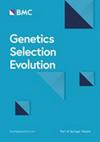Genotype-by-environment interactions for feed efficiency traits in Nellore cattle based on bi-trait reaction norm models
IF 3.6
1区 农林科学
Q1 AGRICULTURE, DAIRY & ANIMAL SCIENCE
引用次数: 0
Abstract
Selecting animals for feed efficiency directly impacts the profitability of the beef cattle industry, which contributes to minimizing the environmental footprint of beef production. Genetic and environmental factors influence animal feed efficiency, leading to phenotypic variability when exposed to different environmental conditions (i.e., temperature and nutritional level). Thus, our aim was to assess potential genotype-by-environment (G × E) interactions for dry matter intake (DMI) and residual feed intake (RFI) in Nellore cattle (Bos taurus indicus) based on bi-trait reaction norm models (RN) and evaluate the genetic association between RFI and DMI across different environmental gradient (EG) levels. For this, we used phenotypic information on 12,958 animals (young bulls and heifers) for DMI and RFI recorded during 158 feed efficiency trials. The heritability estimates for DMI and RFI across EG ranged from 0.26 to 0.54 and from 0.07 to 0.41, respectively. The average genetic correlations (± standard deviation) across EG for DMI and RFI were 0.83 ± 0.19 and 0.81 ± 0.21, respectively, with the lowest genetic correlation estimates observed between extreme EG levels (low vs. high) i.e. 0.22 for RFI and 0.26 for DMI, indicating the presence of G × E interactions. The genetic correlation between RFI and DMI across EG levels decreased as the EG became more favorable and ranged from 0.79 (lowest EG) to 0.52 (highest EG). Based on the estimated breeding values from extreme EG levels (low vs. high), we observed a moderate Spearman correlation of 0.61 (RFI) and 0.55 (DMI) and a selection coincidence of 53.3% and 40.0% for RFI and DMI, respectively. Our results show evidence of G × E interactions on feed efficiency traits in Nellore cattle, especially in feeding trials with an average daily gain (ADG) that is far from the expected of 1 kg/day, thus increasing reranking of animals.基于双性状反应规范模型的内洛尔牛饲料效率性状基因型与环境的相互作用
选择饲料效率高的动物直接影响肉牛业的盈利能力,这有助于最大限度地减少牛肉生产对环境的影响。遗传和环境因素会影响动物的饲料效率,从而导致动物在不同环境条件(如温度和营养水平)下的表型变异。因此,我们的目的是基于双性状反应规范模型(RN)评估内洛尔牛(Bos taurus indicus)干物质摄入量(DMI)和残余饲料摄入量(RFI)的潜在基因型与环境(G × E)相互作用,并评估不同环境梯度(EG)水平下 RFI 与 DMI 之间的遗传关联。为此,我们使用了 158 项饲料效率试验中记录的 12 958 头牛(年轻公牛和小母牛)的 DMI 和 RFI 表型信息。不同 EG 下 DMI 和 RFI 的遗传率估计值分别为 0.26 至 0.54 和 0.07 至 0.41。不同 EG 下 DMI 和 RFI 的平均遗传相关性(± 标准偏差)分别为 0.83 ± 0.19 和 0.81 ± 0.21,极端 EG 水平(低与高)之间的遗传相关性估计值最低,即 RFI 为 0.22,DMI 为 0.26,表明存在 G × E 相互作用。不同 EG 水平的 RFI 和 DMI 之间的遗传相关性随着 EG 越高而降低,从 0.79(最低 EG)到 0.52(最高 EG)不等。根据极端 EG 水平(低与高)的估计育种值,我们观察到中度的斯皮尔曼相关性为 0.61(RFI)和 0.55(DMI),RFI 和 DMI 的选择重合度分别为 53.3% 和 40.0%。我们的研究结果表明,内洛尔牛的饲料效率性状存在 G × E 相互作用的证据,尤其是在平均日增重(ADG)远低于预期的 1 千克/天的饲养试验中,从而增加了对动物的重新排序。
本文章由计算机程序翻译,如有差异,请以英文原文为准。
求助全文
约1分钟内获得全文
求助全文
来源期刊

Genetics Selection Evolution
生物-奶制品与动物科学
CiteScore
6.50
自引率
9.80%
发文量
74
审稿时长
1 months
期刊介绍:
Genetics Selection Evolution invites basic, applied and methodological content that will aid the current understanding and the utilization of genetic variability in domestic animal species. Although the focus is on domestic animal species, research on other species is invited if it contributes to the understanding of the use of genetic variability in domestic animals. Genetics Selection Evolution publishes results from all levels of study, from the gene to the quantitative trait, from the individual to the population, the breed or the species. Contributions concerning both the biological approach, from molecular genetics to quantitative genetics, as well as the mathematical approach, from population genetics to statistics, are welcome. Specific areas of interest include but are not limited to: gene and QTL identification, mapping and characterization, analysis of new phenotypes, high-throughput SNP data analysis, functional genomics, cytogenetics, genetic diversity of populations and breeds, genetic evaluation, applied and experimental selection, genomic selection, selection efficiency, and statistical methodology for the genetic analysis of phenotypes with quantitative and mixed inheritance.
 求助内容:
求助内容: 应助结果提醒方式:
应助结果提醒方式:


